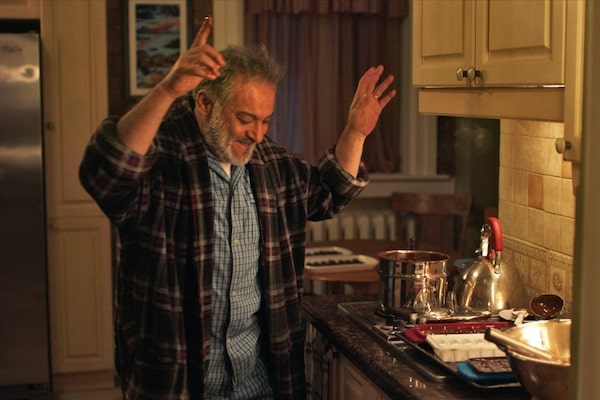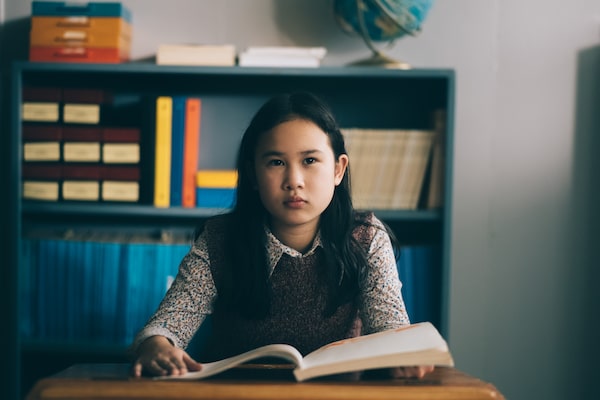
Hatem Ali in Peace by Chocolate, a 2021 feature based on the true story of the Hadhad family, Syrian refugees who within a year of arriving in Antigonish, N.S., in 2015, had re-established their chocolate factory.Courtesy of Vortex Media
Tatiana Niyonkuru is an 18-year-old refugee from Burundi who came to Canada without her family six months ago. She lives in a youth shelter in Ottawa.
“It’s a very welcoming country,” she said. “It’s hard because I came here so young but you get used to it, day by day.”
Among those who have welcomed Niyonkuru to Canada are Governor-General Mary Simon and her husband, Whit Fraser: The young woman was one of about 280 guests at a screening of Canadian films at Rideau Hall last month. She was one of the most recent arrivals in the room but half the audience, recruited from English and French second-language classes, had been in Canada less than five years.
The event, the first of its kind at Rideau Hall, reflects Simon’s and Fraser’s belief that Canadians, whether new, long-settled or Indigenous, can be united through storytelling. Hoping to organize regular film screenings, they teamed up with Reel Canada, the group dedicated to promoting Canadian film, to offer a sneak preview of National Canadian Film Day: On April 17, Reel Canada is organizing more than 1,000 screenings across the country in cinemas and public libraries, and in various international venues including Canadian embassies.
“In the climate where there are growing tensions all across the country, can we do something?” Fraser said. “Hopefully we will have events every year in Rideau Hall that feature Canadian films that reflect today’s diversity and the reality of the country, and help us to see and recognize and understand one another to a much greater extent.
“But it was a bit of a puzzle,” he added, explaining that they wondered how to make this abstract goal a reality. “We were looking at that loosely,” he said, and this event became “a cornerstone.” He and Simon are particularly interested in showing Indigenous films at future events: “Those stories need to be seen. Reconciliation is very high on the Governor-General’s agenda.”
He added that one of the biggest lessons Rideau Hall learned from the screenings, which featured question-and-answer sessions after each film and a reception, was to reach out beyond the traditional Ottawa guest list. Reel Canada specializes in showing Canadian films to new Canadians and recent arrivals. In this instance the group found them by contacting their teachers in the English and French school boards in Ottawa where adult newcomers can take both federally and provincially funded language courses.
Students with the language skills to understand the films were asked if they were interested in attending and invited accordingly. The event welcomed people from about 40 different countries including Afghanistan, Syria, Iraq, Eritrea, Cameroon, China, Haiti and Ukraine. Federal MPs were also invited, but the event fell on the night of the parliamentary vote over an NDP motion on the war in Gaza and few were in attendance.
Those newcomers studying English saw Peace by Chocolate, a 2021 feature based on the true story of the Hadhad family, Syrian refugees who within a year of arriving in Antigonish, N.S., in 2015, had re-established their chocolate factory. The film was directed by Jonathan Keijser, a Canadian working in Los Angeles, but the question-and-answer session featured an appearance by Tareq Hadhad himself: He is now a public speaker dedicated to promoting immigration in Canada.
“It was a good film, inspiring,” Niyonkuru said, “because it’s a family of new immigrants who succeed by their own means, and never give up hope.” (She said this in French, her first language alongside her native Kirundi; she is now learning English and hopes to eventually go to university to study statistics.)
Meanwhile, the French-language learners saw Ru, the 2023 film based on Kim Thuy’s 2009 Governor-General-Award-winning autobiographical novel about a young girl who comes to Quebec as a Vietnamese boat person. It features scenes of young Tinh’s comfortable life in Vietnam before the war, her stay in a Malaysian refugee camp and her adaptation to life in Granby, Que. After the film, the audience swamped Thuy and director Charles-Olivier Michaud with their impressions, sharing stories about their own migrations and asking questions about cinema.

Chloé Djandji in Ru. The 2023 film is based on Kim Thuy’s 2009 Governor-General-Award-winning autobiographical novel about a young girl who comes to Quebec as a Vietnamese boat person.Handout
“It was a touching event,” said Thuy. “There was so much love in the room, everyone was hugging and tearing up. It was a moment of communion.” She compared the overwhelming emotions that surfaced as people from different countries found that they shared experiences similar to her own first days in Canada back in the 1970s.
“We were invited to events that were overwhelming when we first arrived,” she said, recalling how as a young girl she got off a bus in Granby, exhausted after the long trip and suffering from skin infections and lice, only to be embraced by her hosts as though she were the greatest treasure.
“They gave me back the humanity I had lost on the way,” she said. “The movie is a reminder we are capable of great generosity and kindness.” She added that she tells the inspirational story of her welcome in Canada to counter examples of racism or discrimination that immigrants also face.
Similarly, Hadhad feels that telling his family’s success story helps newcomers and dispels prejudice.
“It was a message of encouragement I was trying to relay to newcomers in that room,” he said. “I knew when I arrived eight years ago, how much help and empathy I needed. It took me back.”
And yet, a successful film can’t just be aimed at an audience that directly empathizes with its story. Thuy feels that Ru’s particular strength is how Michaud captures Tinh’s wonder at such exotic items as cozy slippers or egg sandwiches, thus allowing a non-immigrant Canadian audience to see their culture as an outsider might.
Meanwhile, Michaud points out that novelists and filmmakers are not creating their work with a nationalist agenda.
“As filmmakers, we don’t make the film as a template for a Canadian anything. We just try to make the film as true to ourselves, with artistic integrity. Nobody said we want to make a film about the immigrant experience or the Canadian experience. We are more humble than that.”
At Rideau Hall, he particularly enjoyed talking cinema with some high school students in the audience.
“It is always fun to be reminded that film is a universal art form that anyone in any language can respond to. That brings people together.”
National Canadian Film Day 2024: Films That AI Could Never Make takes place April 17. For screenings see canfilmday.ca
 Kate Taylor
Kate Taylor